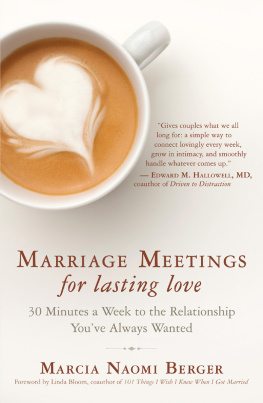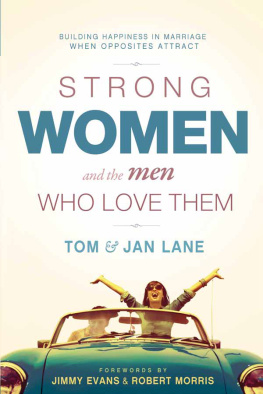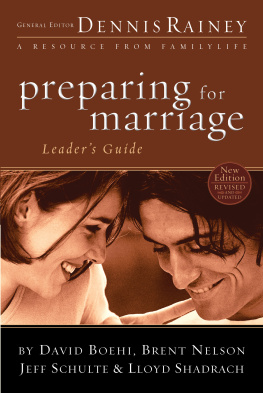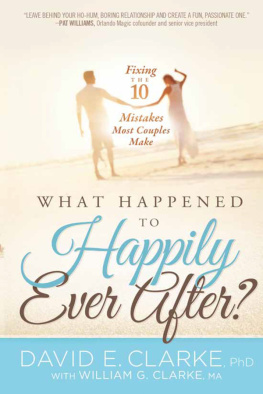ACKNOWLEDGMENTS
P erhaps the greatest advantage in writing this book has been the opportunity to teach communication skills to thousands of people in countries around the world. From this extensive experience on four continents, we have gained innumerable insights about our fellow human beings as they struggle to make their relationships work. The greatest of these is the sure knowledge that we are more similar in our needs than we are separated by our differences. We have been warmed by peoples hearts and educated by their willingness to share with us. This book benefits from the richness of those experiences. We thank Dr. Thomas Gordon and his Effectiveness Training programs and the California Healthy Marriages Coalition (CHMC) for these unparalleled opportunities to teach and learn.
We have also educated ourselves with many personal growth experiences that have contributed greatly to this book. These experiences classes, workshops, seminars, groups, therapyhave also propelled our growth as individuals and nurtured our relationship in countless important ways. The best investment you can make is in yourself is a saying that rings profoundly true in our lives, and we strongly endorse personal growth as a foundational investment for being able to create a world class marriage.
We are grateful to CHMC President Dennis Stoica for early championing of our World Class Marriage Workshop for couples and for fostering widespread adoption of this program throughout California, as well as to CHMC partnering organizations headed by Ariel Meza, Bishop John Sanchez, Dr. Eun Soon Yang, David DLeon, and Daniel and Liz Ballon, who were early and enthusiastic supporters of the World Class Marriage program.
We are most grateful to Jeanne Fredericks, our literary agent, who has distinguished and endeared herself to us in many ways, including her conscientious shopping and shepherding of our manuscript and her unfailingly classy and trustworthy professionalism. We feel most fortunate to have Jeanne as our agent. We are delighted to have Rowman & Littlefield publish our work and thank our editor, Suzanne Staszak-Silva, for recognizing its unique value amid a crowded field of marriage and relationship books and for supporting its publication.
Finally, we want to thank Diane Sollee, founder and director of the Coalition for Marriage, Family, and Couples Education, as well as the Smart Marriages Conference and listserv, who recognized the importance of working in preventive ways to help couples learn how to create healthy and satisfying relationships, coined the term marriage education, and began and fostered the formation of what is now an international infrastructure of marriage support programs and providers. She should be regarded as a heroine for marriages and families and a national treasure.
CONCLUDING THOUGHTS
A world class marriage is a dynamic relationship, always growing and evolving and always grounded in trust, caring, sensitivity, and skills. We have presented sixteen essential pillars that will help make your marriage world class. We know from our own more than thirty-year relationship how profoundly rewarding this can be. It can be for you and your loving partner, too.
In closing, let us remind you of the fundamentals:
- give the gifts of empathy, acceptance, and genuinenessthe three ingredients that most contribute to personal growth;
- commit to finding solutions that meet both partners needs;
- take responsibility for getting your needs met in life and for developing yourself as a person;
- learn how to communicate your caring in ways that resonate for your partner and be generous in so doing;
- surrender, apologize, and forgive when appropriate;
- nurture the honeymoon feelings;
- and finally, keep the heart-to-heart connection strong at all times.
These fundamentals take practice, and they take commitment. A full complement of these skills is rarely picked up naturally from childhood, and they arent included with a marriage certificate. Most people have to work hard to recognize and then undo the less-than-helpful patterns they bring into the relationship with their partner.
When you spot your undesirable behaviors, remember not to blame yourself (it doesnt help). Instead, give yourself kind but genuine acceptance (that does help), and simply observe the old pattern playing itself out (Thats me!). Then go back and clean it up with your partner by using your new fundamentals. Using this method, your undesirable patterns gradually weaken and fade away as you replace them with the skills learned from this book. This can be a difficult, even exasperating, process, but one that delivers many rewards.
In the end, creating a world class marriage is like life itself. Its not the end result that is to be savored so much as the process. And the process of creating a world class marriage is one of sharing, intimacy, and joy. It is a long pathway that you share together with wondrous treasures hidden all along the way.
We are confident that the insights in this book will greatly benefit your relationship, and we extend you our very best wishes for enjoying a long and satisfying world class marriage.
NOTES
- Benjamin Scafidi, The Taxpayer Costs of Divorce and Unwed Childbearing (New York: Institute for American Values, 2008).
- Diane Sollee, Coalition for Marriage, Family, and Couples Education, www.smartmarriages.com.
- John M. Gottman and Nan Silver, The Seven Principles for Making Marriage Work (New York: Crown Publishers, 1999).
- C. B. Truax, Effective Ingredients in Psychotherapy: An Approach to Unraveling the Patient-Therapist Interaction, Journal of Counseling Psychology 10 (1963): 25663; also Robert R. Carkhuff and Bernard G. Berenson, Beyond Counseling and Therapy (New York: Holt, Rinehart and Winston, Inc., 1967).
- Philip Blumstein and Pepper Schwartz, American Couples: Money, Work, Sex (New York: Morrow, 1983).
- For more information, see Dr. Gordons books P.E.T: Parent Effectiveness Training (New York: New American Library, 1970) and L.E.T.: Leader Effectiveness Training: The No-Lose Way to Release the Productive Potential in People (New York: Bantam, 1980).
- John Gottman, Why Marriages Succeed or Fail... and How You Can Make Yours Last (New York: Fireside, 1994), p. 181.
- J. R. Gibb, Defense Level and Influence Potential in Small Groups, in Leadership and Interpersonal Behavior , edited by L. Petrullo and B. M. Bass (New York: Holt, Rinehart and Winston, 1961), pp. 6681.
- David Popenoe and Barbara Defoe Whitehead, The State of Our Unions: The Social Health of Marriage in America (Princeton, NJ: The National Marriage Project, 2002), http://marriage.rutgers.edu.
- M. Phillips and J. T. Lurito, Men Do HearBut Differently than Women, Brain Images Show, press release, 28 November 2002, http://www. medicine.indiana.edu/news_releases/archive_00/men_hearing00.html.
- John M. Gottman and Nan Silver, The Seven Principles for Making Marriage Work (1999). (New York: Random House, 1999), p. 37.
- John M. Gottman and Nan Silver, The Seven Principles for Making Marriage Work (1999). (New York: Random House, 1999), p. 37.
- Gottman Institute, 2002, www.gottman.com.
GLOSSARY
acceptance : Feeling comfortable with your partner the way he or she is; having no need or desire to change him or her. Acceptance of your partners thoughts and feelings is one of the three most powerful ways you can help him or her deal with a problem. Acceptance is conveyed through power listening.
active listening : Showing empathy to your partner by summarizing your partners thoughts and feelings. See power listening.






